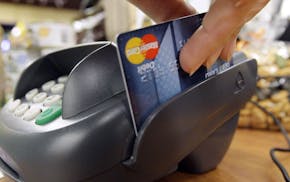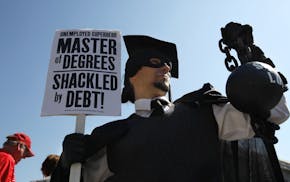Beware monopolists claiming they have the best interests of consumers in mind.
Life may offer few absolutes, but this one might serve as a useful guidepost for Minnesota legislators who are considering a bill that would make it easier for consumers to resell tickets to concerts and sporting events.
Venues, such as Xcel Energy Center, oppose the measure. So does Ticketmaster, which has exclusive ticketing arrangements with many of the country's most popular facilities and top-selling artists. In 2011, Ticketmaster sold more than 250 million tickets to sporting and concert events. All those convenience fees and sundry surcharges added up to $1.2 billion in ticketing revenue for Ticketmaster, now a unit of LiveNation.
Ticketmaster's lobbyists and opponents of the proposed measure say it would open the door even wider to scalpers, who would use computer programs to gobble most tickets and jack up the prices consumers would be forced to pay to attend popular events.
Don't believe it. Scalping already occurs, though not nearly to the extent that concert promoters, Ticketmaster and others say. One academic study -- there are a surprisingly large number of them related to ticket pricing -- estimated that 4 percent of event tickets were resold on eBay and StubHub.
And by the way, Ticketmaster and concert venues aren't opposed to scalping. They just want to make sure they get a slice of those scalping profits.
Oops, my mistake. Ticketmaster doesn't scalp. It "resells" tickets through a subsidiary, TicketsNow.
Here's how that looks for the June 3 concert by Roger Waters, one of the founding members of the 1970s supergroup Pink Floyd.
As of Friday, the Xcel show was not sold out, and Ticketmaster's website had floor seats still available for $199 each (before $20 in fees and surcharges).
On TicketsNow, floor seats start at $361 each.
On StubHub, which is owned by eBay, floor seats were listing Friday for $250 to $899.
The biggest difference between TicketsNow and StubHub is who pockets the additional profit when a floor seat sells for more than $199.
On StubHub, it could be a faceless third-party scalper. Or it could be someone like you or me, who, for a variety of reasons, can't use any or all of the tickets we bought.
On TicketsNow, that money ends up in the pockets of either Ticketmaster, the Xcel Energy Center, Roger Waters -- or perhaps all three.
This has become a common practice in the music industry, though one not well known or understood by concertgoers. As sales of recorded music have plummeted, artists rely more heavily than ever on concert tours. To keep the fans coming, and to avoid being perceived as greedy, they often underprice most of the tickets to their shows.
But not all of them. Some performers allot a certain number of tickets to authorized resellers. If demand drives ticket prices to stratospheric heights, the performer reaps a share of the profit.
This is OK in Ticketmaster's world. But it's not when you or I try to get in on the act by reselling our tickets through StubHub or another third-party service.
Conveniently, both companies play a big role in organizations that are dueling to represent the best interests of consumers. Ticketmaster is a founding member of the Fans First Coalition, which includes representatives from Xcel and Target Center. StubHub endorses the Fan Freedom Project.
In Tennessee, Ticketmaster pushed hard for the Fairness in Ticketing Act of 2012, which would have allowed ticket issuers to revoke consumer tickets at any time, with or without cause. The measure appears to have stalled for now.
In Minnesota, Ticketmaster finds itself on the defensive. The measure, which is being pushed by eBay and StubHub, would prevent venues from restricting people's ability to resell tickets. It passed the House last week but remains stalled in the Senate.
Ticketmaster upped its lobbying spending in Minnesota last year, to $100,000 from $60,000. EBay followed suit, also spending $100,000 last year.
Nobody likes scalpers, but they are a legal service provider. The Web, which allows anyone to be a scalper, has curbed the ability to charge extortionate prices. In addition, technology can be used to prevent scalpers from snatching up large amounts of tickets.
Switching to dynamic or variable pricing, like the airlines, could also diminish the value of scalpers. Broadway venues have already started to do this.
Otherwise, there are few instances in life where the original seller of an item can restrict or have a claim on any future profits you might realize.
It doesn't happen when you resell your house, or your car, or something you bought at a yard sale or an online auction. It shouldn't happen with tickets to concerts or sporting events, either.
ericw@startribune.com • 612-673-1736

Wieffering: Time to get over debit card fees
For Thrivent and others, warnings were there

With billions in sales, some co-ops are big business
